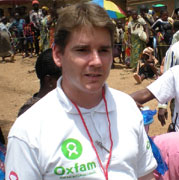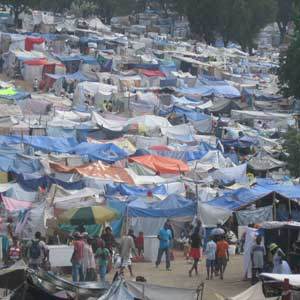
Marcel Stoessel is Oxfam Great Britain's Humanitarian lead in Haiti
Oxfam continues to work closely with Haitian communities in the aftermath of January's devastating earthquake. Marcel Stoessel reflects on achievements so far.
Marcel Stoessel is the Humanitarian lead for Oxfam in Haiti
When I returned to Haiti in January 2010 after my last mission in 2007-08, there was no immigration official to stamp my passport any more. 13 out of 15 Ministries have been destroyed. In places the scene driving up the hill of Port-au-Prince resembled a bombarded city: some buildings seem to have collapsed like card houses; damaged vehicles do not even catch your eye any more; and "we need help" signs try to catch the attention of the thousands of aid workers like me. In the history of the world, there must have scarcely been 45 seconds that brought more fear, death, injury and damage to property than in the earthquake that hit this poor nation on 12 January 2010.
Oxfam has been in Haiti since 1978 and was also here on 12 January. One of our office buildings has half collapsed, killing a beloved national staff member. Yet the committed women and men of Oxfam responded quickly with life-saving activities, trucking tens of thousands of litres of water, digging emergency latrines, clearing waste and injecting cash into the economy by employing people to clean the streets.
I had read the media reports on aid being slow, and the immensity of the needs made me understand that it is never quick enough. With 1 million people in need of assistance, aid is always going to be slow and somewhat insufficient. But we are doing a lot: we are now reaching 80,000 people since the earthquake struck, and that figure will increase, with more people receiving assistance every day.
We aim to reach half a million people in the first six months, and that's only Oxfam - we are far from alone, as the world's citizens and governments have reacted so generously to the tragedy.
But the most important and admirable humanitarians are the Haitians: they have shown incredible courage, resilience and solidarity: many have rescued people with their bare hands and many are still housing strangers. And these are not middle class families: most lived on less than $2 (US dollars) a day before the quake. Some of our Haitian staff do not even have a place to stay, yet there is no day of the week when they do not come to work.
The administration and logistics of such big aid operations are hard to imagine if one is not here. To give an example: we have recruited 150 additional staff since the earthquake and another 150 are yet to come. Job adverts went out on radio stations, 7,000 CVs were received and screened and hundreds of candidates were interviewed. Even in an emergency, one wants to make sure that the engineers we hire are good, because the last thing we want to leave behind in Haiti is a job badly done.

Petionville Club, a golf course in Port-au-Prince, now houses thousands of displaced quake survivors. Credit: Liz Lucas/Oxfam
One of the nightmares for our managers is to divide their time between field visits and endless coordination meetings. If you are not in the field enough, you risk being disconnected from the needs of the people or missing important developments in this fast-changing environment. If you are not in some of the key meetings, you risk duplicating work of other NGOs, while other people may be left without assistance. Everything takes an incredible amount of time and energy here. So we have to give both and work longer hours.
Oxfam works very closely with local communities, local partner organisations, local and national authorities, and technical services of the state. All of them have themselves been affected by the disaster. But it would be arrogant and short-sighted for us to believe we know better than Haitians about what is good for Haiti. Imagine how helpless you would feel if disaster struck and your government's capacity was reduced, while hundreds of well-known and less-known organisations came and started implementing their plans without much consultation.
When I met the Haitian Prime Minister in a police station that now serves as his makeshift office, he told me that his day is filled with visits from foreign delegations, who come to explain their plan for Haiti. "I have an added value when it comes to Haiti", he said. He was interested in and appreciated Oxfam's work, and gave me valuable guidance of what he wants to see us doing. The task ahead is enormous for the government and the international community. There is space for everyone. But those in charge must be the Haitians.
Not only the aftershocks, which sometimes wake me up at night and make me wonder whether this is another big one, but also the first downpours of rain, have reminded all of us that this emergency is far from over.
Let us never forget that this country was one of the poorest and most vulnerable in the world when it was hit by an apocalyptic disaster. We must double and triple our efforts to live up to the expectations of the Haitian people.